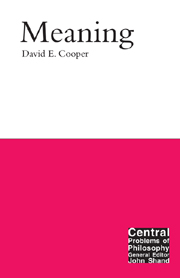3 - Language
Summary
Chapter 2 provided an informal survey of the reach of meaning, with attention drawn to the many fields to which meaningful items belong, the various focuses under which such items are put and the different frames employed for indicating the meanings of items. It did not, I urged, follow from the protean reach of meaning that “mean” and related terms were ambiguous. Nor, I argued, was it legitimate to expel any of our talk of meaning – for example, of “natural” meaning – from the purview of an account of the meaning of meaning. What the reach of meaning reflects, rather, is variety in what count as explanations of meaning. To amend Wittgenstein's remark on the concept of understanding, we should regard the various kinds of meaning explanations as going to “make up our concept of meaning” (1969: §532). Meaning is what explanations of meaning, deployed “in the stream of life”, explain. These explanations, I suggested, indicate – in a manner that typically relies on background, implicit understanding – connection to Life. That connection I dubbed “appropriateness”. My talk of Life and appropriateness was, of course, bland, but not empty, for it suggests a direction to be taken by enquiries into whatever fields of meaning engage our interest. Enquiry should focus on explanations of meaning in that field, in particular on the ways they serve to indicate the appropriateness of items in relation to Life.
- Type
- Chapter
- Information
- Meaning , pp. 40 - 62Publisher: Acumen PublishingPrint publication year: 2003



